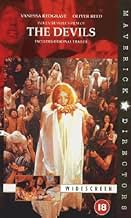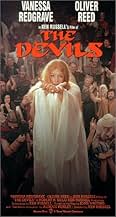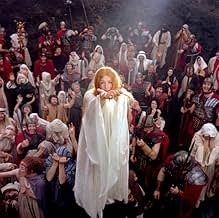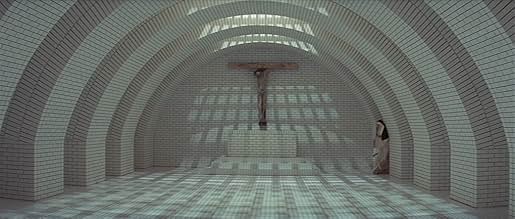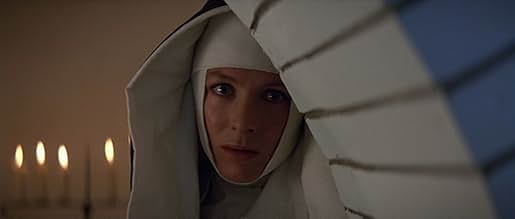Nella Francia del XVII secolo, Padre Urbain Grandier cerca di proteggere la città di Loudun dall'ordine costituito dal corrotto Cardinale Richelieu. L'isteria scoppia in città quando viene a... Leggi tuttoNella Francia del XVII secolo, Padre Urbain Grandier cerca di proteggere la città di Loudun dall'ordine costituito dal corrotto Cardinale Richelieu. L'isteria scoppia in città quando viene accusato di stregoneria da una suora sessualmente repressa.Nella Francia del XVII secolo, Padre Urbain Grandier cerca di proteggere la città di Loudun dall'ordine costituito dal corrotto Cardinale Richelieu. L'isteria scoppia in città quando viene accusato di stregoneria da una suora sessualmente repressa.
- Regia
- Sceneggiatura
- Star
- Premi
- 4 vittorie totali
Izabella Telezynska
- Sister Iza
- (as Iza Teller)
Tony Allen
- Spectator
- (non citato nei titoli originali)
Recensioni in evidenza
This film never got the credit it deserved. It's both a savage socio-political critique in the vein of Millers "The Crucible" and a crazed excerise in Grand Guignol. Only Russell could have pulled this one out. Also features Oliver Reed in one his greatest roles. Father Grandier was Reeds Maximus.
10vassl1
Shocking, beautifully elegant, a truly provocative masterpiece that induces raw emotions. 10/10
Two years before 'The Exorcist' hits the screen, Ken Russell puts the Catholic Church in the spotlight by filming one of the most disturbing films of all times. Except from being a sheer technical and aesthetic masterpiece, 'The Devils' provokes as a film with its relentless sense of anarchy. Religious hysteria and illusions, the horror of human arrogance and depravity and the love that turns to cherishing that turns to hatred. It's hard to put it in words, one must simply watch it to understand the simple splendor of this film. For open-minded viewers only...
Two years before 'The Exorcist' hits the screen, Ken Russell puts the Catholic Church in the spotlight by filming one of the most disturbing films of all times. Except from being a sheer technical and aesthetic masterpiece, 'The Devils' provokes as a film with its relentless sense of anarchy. Religious hysteria and illusions, the horror of human arrogance and depravity and the love that turns to cherishing that turns to hatred. It's hard to put it in words, one must simply watch it to understand the simple splendor of this film. For open-minded viewers only...
10degelb
Cited by director Alex Cox and critic Mark Kermode as one of the ten greatest achievements in cinema of all time, The Devils is based on a true story set in France in 1634 about the evils of the union of church and state controlled by power hungry, perverse men who prey on faith and fear, and one priest, Father Grandier, who tries to protect the liberties and walls of his city, Loudun.
This film was met with great controversy and opposition due to its contents and depictions of blasphemy. Hardly available today, the current VHS release suffers from trigger happy censors with no desire to leave the plot intact. The video translation is appalling, with only a fraction of the resolution and quality of film, and the fullscreen framing mauls at least 60% of the compositions. If you can attain this on widescreen on DVD, you are a lucky person. Unfortunately, as is reflected by another comment on this board, most people see the crappy version and judge the film based on that.
This film was met with great controversy and opposition due to its contents and depictions of blasphemy. Hardly available today, the current VHS release suffers from trigger happy censors with no desire to leave the plot intact. The video translation is appalling, with only a fraction of the resolution and quality of film, and the fullscreen framing mauls at least 60% of the compositions. If you can attain this on widescreen on DVD, you are a lucky person. Unfortunately, as is reflected by another comment on this board, most people see the crappy version and judge the film based on that.
British director Ken Russell's adaption of Aldous Huxley's book "The Devils of Loudun" is one of the most origional, controversial and daring films ever made. The film takes place in 17th-century France and centres on the hypocritical and licentious behaviour of debauched priest Father Urbain Grandier, brilliantly played by Oliver Reed. A second plot strand involves the humpbacked nunn Sister Jeanne, played by Vanessa Redgrave, who, along with her fellow nuns, is obsessed with Grandier. When the nuns become seemingly possessed, disgruntled representatives of the Catholic Church and corrupt officials move in and seize their opportunity to get rid of Grandier.
The film gets off to an excellent start, gradually building up the tension and highlighting the flaws within the Catholic religion. However the middle section involving the possession of the nuns is far too theatrical and over-the-top and the action becomes weighed down by the overbearing performance of Michael Gothard as Father Barre and Derek Jarman's lurid sets. The final section of the film, however, is mightily impressive and well-scripted and benefits hugely from Oliver Reed's committed performance.
While Vanessa Redgrave impresses in the role of Sister Jeanne this is Oliver Reed's film and a performance which proves he was a great actor and not just a great hellraiser. This film illustrates that he is easily the equal of his contemporaries including Caine, Connery, Harris and Finney.
While director Ken Russell's films can range from the very good to the absolutely awful "The Devils" is without doubt his best. This is perfect material for Russell to work with and the ideal outlet for his unique vision. Russell was part of the new breed of controversial directors who emerged in the late 1960s and 1970s who courted controversy with images of sex, nudity, violence and shocking images. "The Devils" is no exception and while it will by no means be to everyone's taste it should be commended for its daring take on the hypocritical side to religion and for helping to pave new ground in cinema.
The film gets off to an excellent start, gradually building up the tension and highlighting the flaws within the Catholic religion. However the middle section involving the possession of the nuns is far too theatrical and over-the-top and the action becomes weighed down by the overbearing performance of Michael Gothard as Father Barre and Derek Jarman's lurid sets. The final section of the film, however, is mightily impressive and well-scripted and benefits hugely from Oliver Reed's committed performance.
While Vanessa Redgrave impresses in the role of Sister Jeanne this is Oliver Reed's film and a performance which proves he was a great actor and not just a great hellraiser. This film illustrates that he is easily the equal of his contemporaries including Caine, Connery, Harris and Finney.
While director Ken Russell's films can range from the very good to the absolutely awful "The Devils" is without doubt his best. This is perfect material for Russell to work with and the ideal outlet for his unique vision. Russell was part of the new breed of controversial directors who emerged in the late 1960s and 1970s who courted controversy with images of sex, nudity, violence and shocking images. "The Devils" is no exception and while it will by no means be to everyone's taste it should be commended for its daring take on the hypocritical side to religion and for helping to pave new ground in cinema.
Ken Russell is one of those filmmakers whose work you can immediately identify. Whether your first was "Altered States" or (like me) "The Devils," you learn early on that if Mr. Russell's name is listed as director and/or writer, you can expect to be at least a little disturbed.
"The Devils" is, in my humble opinion, one of the best films ever made. I wish I hadnt been born so late because I can imagine how truly intense an experience it must've been to view "The Devils" in theater.
This film is the only film I've ever seen, regardless of genre, to take the viewer into the pit of hell and to hold her/him there unrelenting, uncompromising, and to make the viewer feel as s/he has actually experienced hell. I can only imagine how much difficulty Mr. Russell must have had when MPAA members saw this film. It's bleak, horrifying, shocking, disgusting and thoroughly delicious. Aldous Huxley (the author of the book on which this film was based) would have been proud to see that his true story of a Satanic Catholic church translated very well to film.
One last thing: I have never really been able to sit through the entire film since the first time I saw it. That is, odd as it sounds, extreme praise. What kind of hell would it be if I could sit comfortably?
Thank you, Ken Russell!
"The Devils" is, in my humble opinion, one of the best films ever made. I wish I hadnt been born so late because I can imagine how truly intense an experience it must've been to view "The Devils" in theater.
This film is the only film I've ever seen, regardless of genre, to take the viewer into the pit of hell and to hold her/him there unrelenting, uncompromising, and to make the viewer feel as s/he has actually experienced hell. I can only imagine how much difficulty Mr. Russell must have had when MPAA members saw this film. It's bleak, horrifying, shocking, disgusting and thoroughly delicious. Aldous Huxley (the author of the book on which this film was based) would have been proud to see that his true story of a Satanic Catholic church translated very well to film.
One last thing: I have never really been able to sit through the entire film since the first time I saw it. That is, odd as it sounds, extreme praise. What kind of hell would it be if I could sit comfortably?
Thank you, Ken Russell!
Lo sapevi?
- QuizDerek Jarman's sets are modeled on the sets of Fritz Lang's Metropolis (1927). Ken Russell wanted to avoid the clichéd look of period films and insisted on anachronistic, even futuristic, design. Russell's guidance to Jarman was that it should echo the 'rape in a public toilet' line from the Huxley novel that inspired the film.
- BlooperEarly in the movie when Urbain Grandier (Oliver Reed) is seen grooming his hair. It is a close-up of him supposedly looking at a mirror in the upper left hand corner of the screen, behind the viewer. Obviously there is no mirror as he consistently misses combing the more egregiously messed up parts of his hair and instead repeatedly combs the portions that are already groomed. In fact when he is done, his hair is still messed up.
- Curiosità sui creditiAt the start of the film: "This film is based upon historical fact. The principal characters lived and the major events in the film actually took place."
- Versioni alternativeIn 2012 the BFI persuaded Warners to allow them to release the film on video in the UK. Warners refused to allow the director's cut at all and would only allow the BFI to release the original 'X' certificate version on DVD. Warners refused permission to allow a hi rez release. The BFI produced a superb DVD transfer for the first time in its proper 2.35:1 ratio. The Channel 4 documentary 'Hell on Earth' was included but the 'Rape of Christ' sequence was removed. They also cut a line of dialogue when one of the actors refers to Warners as a bunch of 'c**ts'. Before this in the USA the 'unrated' version appeared as an upcoming release complete with sleeve art. 24 hours later Warners stopped the release!
- ConnessioniFeatured in Omnibus: Russell's Progress (1971)
- Colonne sonoreBourrée d'Avignon
from Secretum musarum (1615)
Music by Nicolas Vallet.
Played as the king's dance in the opening.
I più visti
Accedi per valutare e creare un elenco di titoli salvati per ottenere consigli personalizzati
- How long is The Devils?Powered by Alexa
Dettagli
Botteghino
- Lordo in tutto il mondo
- 2293 USD
- Tempo di esecuzione1 ora 51 minuti
- Mix di suoni
- Proporzioni
- 2.35 : 1
Contribuisci a questa pagina
Suggerisci una modifica o aggiungi i contenuti mancanti


![Trailer [EN]](https://m.media-amazon.com/images/M/MV5BYjgxZTMwNzYtYmE4Zi00ZDNjLWJkZjUtNTQ1NGQ1ZWRmMDAwXkEyXkFqcGdeQXRyYW5zY29kZS13b3JrZmxvdw@@._V1_QL75_UX500_CR0)

